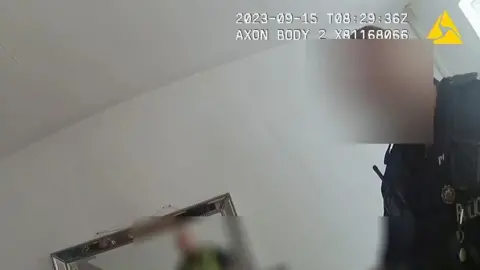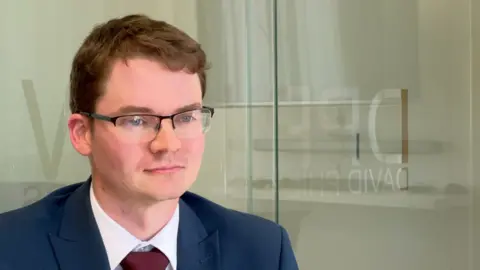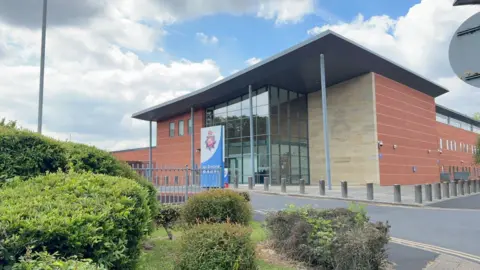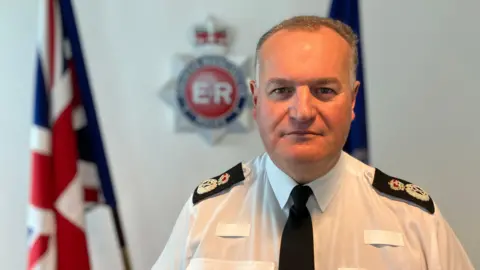Apology over arrest of woman who said she was raped
 GMP
GMPGreater Manchester Police has apologised after the "unnecessary" arrest of a woman after she reported that she had been raped.
Natalia, whose name has been changed, was arrested because of posts she had written on social media.
But she said the man she accused of rape was able to arrange a voluntary interview, avoiding arrest.
A spokesperson for the force, which dropped its investigation into her tweet after two days, said GMP was sorry for the impact that this interaction" had on Natalia.
The spokesperson added: "We have improved officer training on our revised voluntary attendance policy and are ensuring all officers are trained to recognise and respond to the trauma felt by survivors of domestic and sexual abuse."
Natalia reported being raped in 2019, but she said the GMP investigation was "incompetent".
A review later found a series of errors which resulted in some CCTV evidence being destroyed and DNA evidence taking too long to analyse.
No charges were brought.
Natalia said she was then "revictimised" in 2023 when police officers arrested her at her home, telling her she was suspected of sending malicious communications on Twitter, now known as X.
Body-worn video of the arrest shows the officers told her "there's been an accusation made of stuff that's been posted on Twitter that's malicious", but further details were not given.
In response Natalia told them "this is your technique - this is what you do when people raise their voices", adding: "I remember it took you two months to interview my rapist."

Lawyer Aiden Walley, from DPP Law, who later represented Natalia in legal action against GMP, said the arrest was unnecessary because the offence she was suspected of was "a fairly minor offence that happened over the internet".
"They could have called her up and invited her in for a voluntary interview, but they didn't do that.
"Instead they turned up at her house."
When Natalia told the officers that she had a medical appointment later that day, they decided she could instead be offered a voluntary interview in a few days.
When Natalia asked about the interview she was told the investigation had been dropped and there would be no further action.
Mr Walley said the decision to drop the investigation demonstrated that "the original suspicion that she may be guilty of an offence just wasn't objectively reasonable".
He said a voluntary interview should have been offered to Natalia instead of arresting her because "it skips the need for taking a person into custody".
"Being in a cell on their own for likely hours is a poor environment for mental health and it'll certainly make things a great deal worse," he said.

Mr Walley said Natalia's legal team had not been given a definitive list of tweets which were deemed to cause offence, except one which involved a meme animation featuring Homer Simpson.
Natalia later took legal action against GMP.
She said: "I was determined not to let them revictimise me as I'd been dealing with a lot – I'd been dealing with the rape, and I'd been dealing with the aftermath of them not doing their job."
In its defence filed against the legal action, seen by the BBC, GMP's legal team said the officers "genuinely and reasonably believed" an arrest was necessary because "the six-month time limit for a summary-only offence was approaching".
They also said "seizure of electronic devices was likely to be necessary", but Natalia's legal team said that would not be lawful given the level of the offence.
Natalia reached an out-of-court settlement with the force, but said no apology was offered.
The force apologised after being contacted by the BBC.

Chief Constable Stephen Watson announced in 2021 that his force would double the number arrests made each month, after a report which found that, under his predecessor, GMP had closed cases without proper investigations, and failed to record thousands of crimes.
A report last year which had been commissioned by mayor Andy Burnham found officers were making arrests "unwisely, unnecessarily, and sometimes unlawfully".
Report author Dame Vera Baird wrote that the force had put "a premium" on arrests which were "a harmful use of power and a damaging weapon against members of the public".
In response to Natalia's case, a GMP spokesperson said the force was "protecting more victims and bringing more offenders to justice for offences like rape, domestic abuse, and harassment".
"Arresting more suspects has been a necessary and important part of this, but arrests are not – and never have been – considered an end in themselves," they said.
Listen to the best of BBC Radio Manchester on Sounds and follow BBC Manchester on Facebook, X, and Instagram. You can also send story ideas via Whatsapp to 0808 100 2230.
